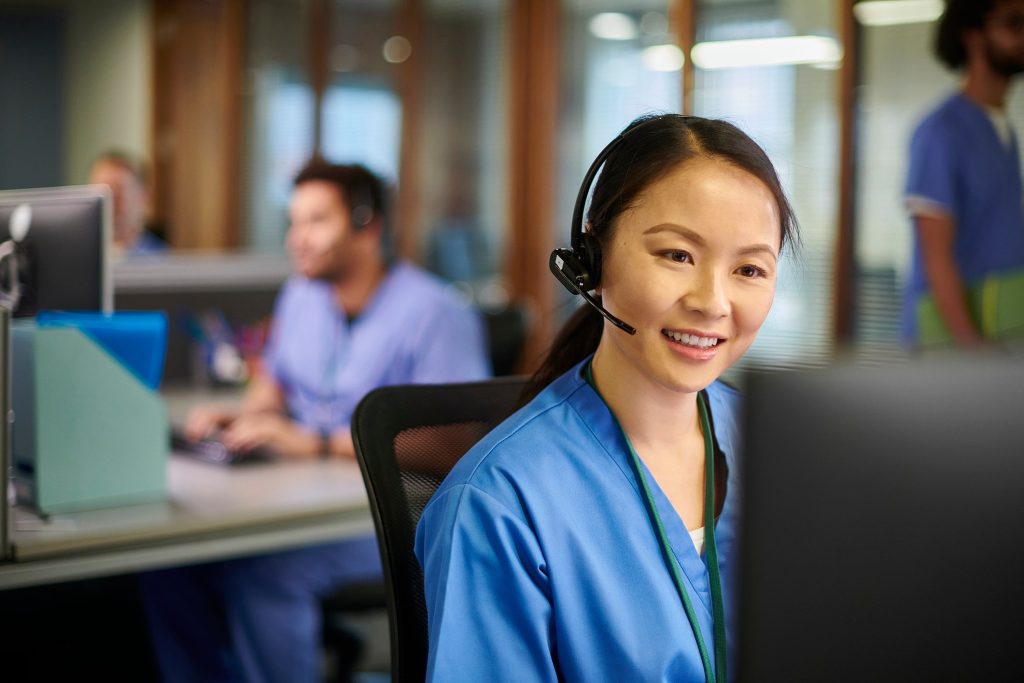How to Become a Virtual Medical Receptionist in Australia
In recent years, the demand for virtual medical receptionists has grown significantly, especially in Australia, where telehealth services and remote work have become more prominent. A virtual medical receptionist plays a critical role in assisting healthcare providers by managing administrative tasks remotely, allowing practices to run smoothly while offering flexibility. If you’re interested in pursuing a career as a virtual medical receptionist in Australia, understanding the required skills, qualifications, and steps to enter the field is essential. This guide provides a comprehensive overview of how to become a virtual medical receptionist in Australia.

Key Qualifications and Skills for a Virtual Medical Receptionist in Australia
1. Educational Requirements
While formal educational requirements for a virtual medical receptionist are not strictly necessary, having the right qualifications can significantly improve your job prospects and set you apart from the competition.
- Certificate III in Business Administration
A Certificate III in Business Administration is a common qualification for anyone looking to enter the administrative field, and it’s particularly useful for those aiming to become a medical receptionist. This course covers topics such as office administration, customer service, and communication, all of which are crucial for performing the day-to-day tasks of a virtual medical receptionist. - Certificate IV in Health Administration
For those wishing to specialise in medical administration, a Certificate IV in Health Administration provides more specific knowledge related to the healthcare industry. This qualification focuses on medical terminology, billing systems, and the administrative needs of medical practices, making it highly relevant for a virtual receptionist role. - Other Relevant Courses
While not mandatory, taking courses in customer service, health administration, or medical terminology can give you an edge in the industry. Many online platforms and vocational education centres offer flexible courses tailored to medical receptionists.
2. Skills and Competencies Required
To succeed as a virtual medical receptionist in Australia, you must possess a unique set of skills and competencies that enable you to manage both the administrative and customer-facing aspects of the role.
- Strong Communication Skills

Effective communication is at the heart of a virtual medical receptionist role. You must be able to communicate clearly and professionally with patients, healthcare providers, and other administrative staff. This includes answering calls, scheduling appointments, and handling patient enquiries. You must also be adept at managing electronic communication via email or chat. - Customer Service Excellence
Since virtual medical receptionists interact with patients regularly, exceptional customer service skills are essential. You need to demonstrate patience, empathy, and professionalism, especially when dealing with patients who may be anxious or upset. - Technical Proficiency
As a virtual role, you’ll be expected to use various digital tools and software. Familiarity with healthcare management software like Medicare, Best Practice, Medical Director, or Zedmed is beneficial. Additionally, proficiency in Microsoft Office (Word, Excel, Outlook) and video conferencing tools like Zoom or Skype is essential. - Organizational Skills
Managing appointments, patient files, and handling multiple administrative tasks at once requires excellent organisational skills. A virtual medical receptionist needs to keep everything well-organised and efficiently manage time, especially when working remotely. - Confidentiality and Attention to Detail
Medical receptionists handle sensitive patient information and must adhere to strict confidentiality requirements under the Privacy Act 1988. Attention to detail is essential when scheduling appointments, entering patient data, and managing medical records to avoid errors and ensure privacy compliance.
3. How to Gain Experience
While formal qualifications are helpful, hands-on experience in an administrative or medical setting will provide you with the practical skills needed to succeed in the role.
- Work Experience in Healthcare Settings
Many virtual medical receptionists begin their careers by working in person at medical practices, clinics, or hospitals to gain experience. This hands-on experience will allow you to become familiar with medical terminology, patient management, and administrative procedures before transitioning to a remote role. - Internships and Volunteer Opportunities
If you’re new to the medical field, seeking internships or volunteering in a healthcare setting can be an excellent way to gain valuable experience. Many clinics or hospitals may offer short-term or volunteer positions, which will help you understand the environment and enhance your resume. - Remote Work Experience
If you already have administrative experience, transitioning into a virtual role will be easier. Consider working in remote administrative roles to familiarise yourself with virtual work dynamics, communication, and software tools. Gaining remote work experience can increase your chances of being hired as a virtual medical receptionist.
4. Getting Certified and Registered
Though it’s not a legal requirement, getting certified can give you credibility and help you stand out in a competitive job market.
- Certification in Medical Receptionist
Some Australian organisations offer certifications in medical receptionist or health administration. This certification can improve your credibility, demonstrate your knowledge of the medical field, and boost your chances of securing a job as a virtual receptionist. - Professional Registration
While not mandatory for a virtual medical receptionist, joining professional organisations like the Australian Medical Receptionists Association (AMRA) can provide networking opportunities, access to training, and help you stay updated with industry standards.
5. Setting Up Your Home Office
Since this is a virtual role, your home office setup is crucial. Here’s what you’ll need:

- Reliable Internet Connection
A fast and stable internet connection is vital for communicating with patients, attending virtual meetings, and accessing healthcare management software. - Computer and Software
Invest in a reliable computer with the necessary software for scheduling, communication, and managing patient data. You may also need to use specific healthcare management systems, so make sure your computer can support them. - Phone Line
Many virtual medical receptionists work with landline or mobile phones for patient calls. Ensure you have a phone that allows you to communicate clearly with patients. - Quiet Workspace
To provide high-quality service, you need a quiet, distraction-free workspace. Ensure your environment is conducive to focusing and maintaining professionalism during calls and virtual meetings.
Supplementary Knowledge and Career Advancement
6. Finding Virtual Medical Receptionist Jobs
Once you have the necessary qualifications and experience, the next step is to find a job. Here are a few ways to get started:
- Job Portals: Websites like Seek, Indeed, and Jora often list virtual medical receptionist positions across Australia. Set up job alerts to get notified of new opportunities.
- Health Industry Recruitment Agencies: Many agencies specialise in placing administrative staff in healthcare settings. Registering with these agencies can provide you with access to a broader range of job opportunities.
- Networking: Join online forums or groups related to medical administration to network with industry professionals. LinkedIn is also a great platform for connecting with employers looking for virtual medical receptionists.
7. Career Progression and Specializations
As a virtual medical receptionist, there are numerous opportunities for career growth and specialisation:
- Senior Receptionist Roles: With experience, you may be able to move into senior receptionist positions that involve additional responsibilities like training new staff or overseeing administrative operations for larger healthcare practices.
- Medical Office Management: With further education or experience, you could transition into roles like medical office manager, which involve overseeing all aspects of a medical practice’s operations, including staffing, scheduling, and billing.
- Healthcare Administration: Another potential career path is to move into broader healthcare administration roles, where you could manage hospital departments, healthcare facilities, or entire healthcare organisations.
Conclusion
Becoming a virtual medical receptionist in Australia is an excellent career option for individuals seeking flexible work while making a meaningful contribution to the healthcare system. By obtaining the right qualifications, developing essential skills, and gaining relevant experience, you can set yourself up for success in this growing field. Whether you are just starting out or are looking to transition into this role, the opportunities for career advancement and specialisation are abundant.

